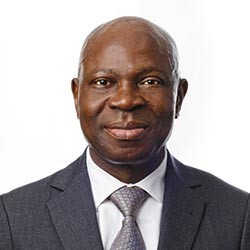Gilbert Houngbo, President of IFAD, at the Food Systems Independent Dialogue of Farmers' Organizations
IFAD Asset Request Portlet
Asset Publisher
Gilbert Houngbo, President of IFAD, at the Food Systems Independent Dialogue of Farmers' Organizations
Location: Rome
08 July 2021Ladies and Gentlemen,
I am delighted to join you for this Dialogue, the culmination of more than 40 such events across the globe.
In the lead-up to the Food Systems Summit, these Dialogues are vital.
When it comes to food systems, the role of small-scale farmers — and their organizations — is too often overlooked.
Yet they are the linchpin.
Small-scale farmers, family farmers and other entrepreneurs who produce, process and market food, are absolutely essential in food systems. You all here today know this very well.
If we really hope to transform these systems to make them more equitable and sustainable, then we need to make them more inclusive. And to make them more inclusive, we need the voices of rural people to be raised and to be heard.
I can assure you that IFAD has been listening.
We need to put small-scale farmers and rural people at the heart of food systems transformation. To that end, we have been supporting farmers’ organizations and the FSS Secretariat to achieve this goal.
The need to transform our food systems is urgent. Hundreds of millions of people still go to bed hungry. This is unacceptable. It is also unacceptable that many of the small-scale producers whose produce feed millions around the world are suffering hungry and poverty themselves.
So, how are we going to put small-scale farmers and their organizations at the heart of food systems transformation?
With our Action Track 4 partners, IFAD has identified three key areas for action.
First, addressing inequalities and empowering small-scale farmers and their communities. This means recognizing the traditional rights and knowledge of Indigenous peoples. It means better access to modern and digital technologies. And it means addressing the challenges faced by women and youth involved in food systems.
Second, we need to ensure decent work within food systems. This means strengthening the rights of rural workers. It means improving governance of labour within food systems. And it means extending social protection systems to these workers.
Third, we need to localize food systems. This means bringing local actors and institutions together to stimulate livelihoods, promote sustainable ecosystems, and ensure healthy diets for all. This cannot happen without sufficient financing, however. And it cannot happen without a partnership with farmers and their organizations.
The pandemic has highlighted the need to focus on the most vulnerable and marginalized people in rural areas and the importance of building resilience through sustained longer-term investment. Only through long term vision and action we will be able to sustain the progress achieved and build back better, stronger and more resilient livelihoods from this and other future shocks.
But these results cannot be achieved by any actor in isolation. Stronger policy engagement and strategic partnerships need to underpin all efforts to expand and deepen impact.
The Food System Summit will be an opportunity to call on leaders to invest in transforming food systems and to make the changes that ensure markets work for small-scale farmers. Rural people need the resources and tools to develop their farms and businesses, and they need to earn the decent and equitable livelihoods they deserve.
Small-scale farmers are the basis of the rural economy, and when they prosper, this creates growth, off-farm opportunities and generates jobs. Transforming food systems is also about transforming their lives.
Ladies and gentlemen,
Let’s join efforts to make our voices heard at the Summit to agree on actionable commitments that will lead to the transformation we all want.
Thank you.
